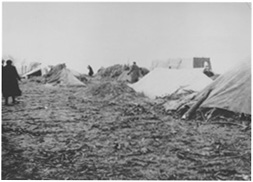Events
The Vienna Wiesenthal Institute for Holocaust Studies (VWI) organises academic events in order to provide the broader public as well as an expert audience with regular insights into the most recent research results in the fields of Holocaust, genocide, and racism research. These events, some of which extend beyond academia in the stricter sense, take on different formats ranging from small lectures to the larger Simon Wiesenthal Lectures and from workshops addressing an expert audience to larger international conferences and the Simon Wiesenthal Conferences. This reflects the institute’s wide range of activities.
The range of events further extends to the presentation of selected new publications on the institute’s topics of interest, interventions in the public space, the film series VWI Visuals, and the fellows’ expert colloquia.
| VWI invites/goes to... | |||
| Michal Frankl: What is in a No Man's Land? Refugees in East-Central Europe in 1938 | |||
Wednesday, 13. March 2019, 17:00 Rudolfskai 42, Hörsaal 387, 5020 Salzburg
|
|||
VWI goes to the Center for Jewish Cultural History at the University of Salzburg
Throughout 1938, a new type of territory rapidly formed along the borders of East-Central European states: a no man’s land. Smaller or larger groups of people were forced to camp alongside roads, on fields, in dilapidated buildings, between border posts, or in interment just behind the border lines. Jews expelled from post-“Anschluß” Austria, those escaping from Czechoslovak borderlands after the Munich Agreement, as well as Polish Jews deported from Germany to Poland and Slovak Jews dumped in Hungary after the First Vienna Award fell victim to restrictive refugee policies, ethnic categorisation of refugees, and sealed borders. Moreover, the physical no man’s land figuratively stood for the growing tendency to denaturalise Jewish refugees and to shift the parameters of citizenship in East-Central Europe. Focussing on the dramatic events and the multiplication of the no man’s lands in 1938, this lecture will offer a comparative and transnational perspective on this new phenomenon. It will explore its geography and spatial characteristics in the context of shifting borders and eroded sovereignty and will establish a basic typology. Based on a variety of sources, from state documents through reports of aid organisations to testimonies, the lecture will differentiate no man’s land from other spatial projects of refugee control, such as refugee or internment camps. Examining no man’s land from within, it will analyse the improvised society emerging therein: its social structures and its relations to and perceptions of the outside world. Moreover, as a space which was not supposed to exist in the first place and with the illegal practices this entailed, the lecture will ask whether no man’s land did not in fact erode the very borders and sovereignty which it was supposed – in the eyes of state officials – to uphold and strengthen. The refugees’ no man’s land offers a fruitful avenue to think about the nexus between refugees and citizenship and about refugee spaces in 1938 and beyond. Commented by Albert Lichtblau Michal Frankl, historian, Research Fellow at the VWI, senior researcher at the Masaryk Institute and Archives of the Czech Academy of Sciences, is currently a research fellow at the Vienna Wiesenthal Institute for Holocaust Studies. He is the principal investigator of the ERC Consolidator grant ‘Unlikely refuge. Refugees and citizens in East-Central Europe in the 20th century’ (starting in September 2019). Albert Lichtblau, historian, he was research fellow in the Center for Research on Antisemitism at Technical University of Berlin and in the Institute of Jewish History in Austria. Currently, he is the assistant director of the Center for Jewish Cultural History at the University of Salzburg. His main research field is oral and audiovisual history. His most recent publication is Martin Krist/ Albert Lichtblau, Nationalsozialismus in Wien. Opfer-Täter-Gegner, Innsbruck-Wien-Bozen 2017. |
|||








